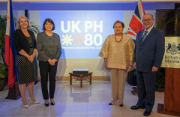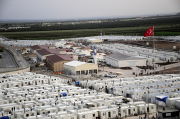
The UK and Ireland have confirmed that Wembley Stadium and Tottenham Hotspur Stadium in North London will host matches in the proposed joint bid to host UEFA
Euro 2028. The bid, submitted on 12th April, proposes 10 stadiums in total, with an average capacity of 58,000 seats, and includes venues across England, Scotland, Wales, Northern Ireland, and the Republic of Ireland.
The proposal, which aims to make the tournament the biggest and most commercially successful Euro tournament to date, will compete against Turkey's bid to host the men's European football tournament in five years' time. A final decision on which country will host the tournament is expected to be made in September.
The news of Wembley and Tottenham's selection as host venues has been welcomed by local leaders. Haringey Council leader, Cllr Peray Ahmet, said she was "thrilled" by the decision and "excited about the benefits" the event would bring to the Tottenham area. She added that hosting matches in the borough would provide a unique opportunity to showcase the area's "outstanding offer in food, night-time economy and culture," and further cement Haringey's place as one of the premier destinations in London.
The bid also includes stadiums in Cardiff, Manchester, Liverpool, Newcastle, Birmingham, Glasgow, Dublin, and Belfast. The National Stadium of Wales, City of Manchester Stadium, Everton Stadium, St James' Park, Villa Park, Hampden Park, and the Dublin Arena have been included in the proposal.
Belfast's Casement Park and Everton's Bramley-Moore Dock, despite currently being unbuilt, are also included in the bid. The proposal aims to make almost three million tournament tickets available, more than any other Euro tournament to date.
A FA statement said that "high-capacity, world-famous football grounds and state-of-the-art new venues will provide the platform for the biggest and most commercially successful UEFA Euro ever," making it a "low risk, high reward" host. If successful, the event would attract tens of thousands of people to the areas hosting the matches, providing a boost to the local economy and a unique opportunity to showcase the areas' culture and nightlife. Photo by Bluejam, Wikimedia commons.







































